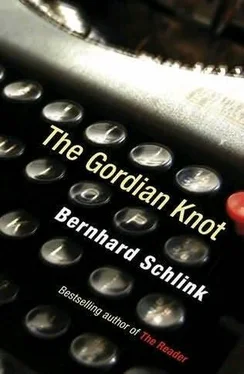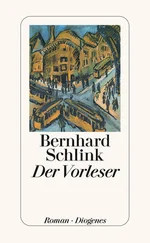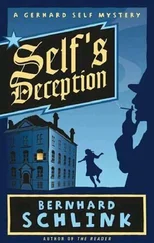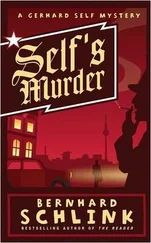He waited for the elevator, his knees shaking. The other day Helen hadn’t felt too well, and told him “My legs are like noodles,” and he had asked her, “Al dente?” at which she had laughed. The silly scene seemed to him the height of happy normalcy. In his room, he lay down on his bed. He fell asleep and dreamed of Françoise, Bulnakov, and the redhead-he was being shadowed, he ran for all he was worth; then he was sitting on a rock in Central Park, the clouds black and hanging low, but the sun had found a hole and made colors shine. There was utter silence. Georg tugged at a blade of grass, and when it came out of the ground together with a long root, he heard a whimpering that grew louder and louder, until it boomed through the park like a thundering howl. He woke up drenched in sweat. Down in the street a police car had driven by. He heard the siren fade in the distance. He got up and took a shower. His fear was gone. He was ready for action.
THE CALL FROM TOWNSEND ENTERPRISES came the following morning at ten.
“Georg! Telephone!” Larry shouted from the kitchen where he was eating breakfast.
“It’s a woman, not Helen, though,” he whispered to Georg. He and Larry had had dinner with Helen the previous evening. Georg had talked a lot, joked, flirted, and Larry and Helen had looked at him in surprise. What had gotten into this quiet roommate and difficult bedfellow? When Georg took Helen home, they walked past a panhandler, and Helen dropped a coin into his cup. She told Georg how in her first few weeks in New York she had been appalled at all the poverty and had put money in all the cups, until a man called out after her, “Hey, you just threw a quarter in my coffee!” Georg shook with laughter. He got the impression that Helen might have liked to take him upstairs but that she found his sudden cheeriness a little frightening. She still hadn’t found anything out about Françoise.
“Mr. Polger? I’m calling from Townsend Enterprises. Mr. Benton would like to know whether you could come by this afternoon. Do you have our address?”
“Please tell Mr. Benton that I’ll be there at four.”
Georg hung up. He could tell that Larry was curious, but didn’t say anything to him. Georg took a cup of coffee to his room, and got a pen and some paper.
Dear Jürgen,
I’m sure you’ll be surprised at getting a letter from me from New York. You’ll be even more surprised that I am asking you to open the enclosed envelope only in the event that you don’t hear from me again within four weeks. I know it sounds a bit cloak-and-dagger, maybe even foolish. It might even remind you of the games we used to play. And yet, it might not sound childish to you at all: as the district judge for Mosbach you must have gotten used to all kinds of things. Be that as it may, I would be grateful if you did this for me, and hope to be in contact with you very soon. Give my best to Anne and the children. Your old friend-
Then Georg wrote down what he knew, guessed, supposed, and feared, and put the thick batch of papers into an envelope, which he crammed into a second larger envelope, and took it to the post office. He didn’t know if he was being watched. But he imagined himself walking to a mailbox, dropping the letter in, walking on, and suddenly hearing a bang, a flame shooting out of the mailbox, with letters fluttering all over Broadway. They wouldn’t be able to blow up a whole post office, though.
At four o’clock he was standing outside the MacIntyre Building. The door was open and painters were working in the lobby. The same dark-haired beauty with the ugly glasses let him in, and showed him into a small, windowless conference room. “Mr. Benton will be with you in a moment.”
The room was gloomy. Dim light came from a slot between the low ceiling and the wall. Six chairs of dark leather stood around a heavy table made of dark wood. Set into the wall was an empty black screen. The air conditioner was humming.
Georg looked around for a dimmer to turn up the light. He couldn’t find one. There was no knob on the door either. The screen lit up with a gentle buzz, and a small image appeared in the middle and grew, coming toward Georg until it filled the screen. There was a lot of black, with flitting yellow and red lights. It took him a few moments to realize that these were video shots taken from a moving car: yellow headlights and red brake lights that jerked with the rattling of the car from which the video was shot. At times the windshield wipers, the hood, the edge of the windshield, or the steering wheel came into the picture. The car was going fast, and yellow headlights came racing by. It was following another car’s red brake lights on the right side of the road and, trailing them, switched to pass the other cars on the left. The passing maneuvers were rough and aggressive, and the approaching headlights shot like a spray of sparks off the screen. The film had no sound. The traffic grew lighter. When there were no more oncoming headlights, and only the red brake lights were ahead, the car swerved next to the other car in front, the camera swinging toward its interior, to the profile of the driver and his hands on the steering wheel. The image kept jumping, showing a trouser leg and the roof of the car, as if the hand holding the camera had been knocked aside. For a few moments Georg couldn’t make out anything. Then both cars were in the picture. They had stopped, one having forced the other into a ditch. In the glare of the headlights, Georg could see two men beating up a third. Pummeling him. The third man collapsed, and the two other men began kicking him. The camera zoomed in, showing the bloody head of the man who was lying motionless on the ground. It showed his face from the side, and the tip of a shoe that pushed his head to the other side. It showed his face from the front. The image on the screen disappeared with a light crackle. A chill ran down his spine. That was him. They had made a video of beating him up on the road back from Marseille.
“My young friend!” The door opened, the room brightened, and an effervescent Bulnakov came bursting in. He was just as fat, but now had on a blue three-piece suit. Gone were the shirt with the unbuttoned collar, the rolled-up sleeves, and the patches of sweat under his arms. There was a hint of eau de cologne. His English had the same hard tone as his French. “I can’t believe Janis made you wait here in this horrible little room. Come with me into my office.”
Georg followed Bulnakov past the map of the world and up the spiral staircase to the next floor, through an empty room with large pictures of trees, and through a double door. Bulnakov was talking incessantly. “This is quite different from my office in Cadenet, isn’t it? I’d have preferred a green carpet here. If you ask me, they overdid it a bit with the color of the wood, and without the green of the leaves, there’s no brown of the trees. The fight I had to put up for those pictures! Ah, but roughing it over there in the south of France had its charm too. Those were good days! Speaking of south, did you know that New York lies on the same latitude as Rome? You’ve already had a taste of the heat and humidity here. You just up and came to New York, to the New World! I’ll admit I was taken aback! I would never have thought you capable of that! But here you are, and I welcome you to the Big Apple and my office!”
He shut the door. It was a corner room with windows on two sides, a bare wall, and a wall with a picture of two beach chairs beneath an umbrella by the sea. In the corner between the windows stood the large desk, and across from it a sofa and chairs. They sat down. He’s all show, Georg thought, and not even especially good at it. The gloomy room they had put him in for the movie, the door without a knob-that had been quite something. But they’d have done better to corner him right then and there: with the walk to Bulnakov’s office and all of Bulnakov’s swagger, Georg’s fear had dissipated.
Читать дальше












